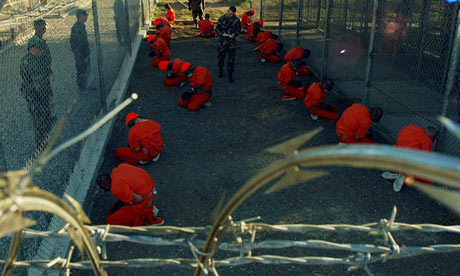
There are two stories that are impossible to make proper sense of in Ahmed Errachidi's graphic and powerful memoir of his five years of illegal detainment and torture in Guantánamo Bay. The first, overriding one, is the cruel insanity of the regime of interrogation that he suffered, a never-ending nightmare of sleep deprivation and beatings and solitary confinement, which he endured with defiance and stubborn courage. The second, which nags just slightly at the first throughout, is Errachidi's account of the bizarre personal decisions that led him to being incarcerated in the first place.
Errachidi had left his native Tangier aged 18 in 1984 to seek his fortune in London. Working first as a washer-up and later as a cook, he established himself in the city, and when he later married back home and started a family he continued to travel between Morocco and Britain illegally, making enough money as a chef in various London restaurants to support his wife and children. In 2001 he recalls watching in horror from a north London cafe as the planes crashed into the twin towers. At about the same time his young son had fallen ill with a heart complaint, and he decided he needed to be at home in Tangier full time to help care for him. With this in mind he quit London, apparently with plans for a new business venture importing silver trinkets from Pakistan to Morocco, and so, just two weeks after 9/11, he took a plane to Islamabad.
In the first few days he was there, he recalls, he was so shocked by the initial television pictures of American bombing missions to Afghanistan that he felt, suddenly, overwhelmingly, that he had to to bear witness and to help. With no real plan in mind, having abandoned his scheduled visits to silver markets, he smuggled his way through the most dangerous border crossing over the Torkhum mountains and "driven by an impulse he couldn't control", and using most of his money, found a driver to take him to Jalalabad, one focus of the American bombardment, with a vague sense of mission to employ his cooking skills for refugees.
Having seen atrocities at first hand – an F-16 bombing, apparently deliberately, a bus full of women and children – he himself became a terrified refugee without a friend in a country under siege. In what follows in this book Errachidi proves so resourceful as a man and so logical as a narrator that his mostly unexplained naivety in this initial journey is hard to fathom. At the least, you can begin to understand why, after a series of wildly unfortunate wrong turnings, and having apparently been sold for money to the CIA by Pakistani police in the diplomatic lounge of Islamabad airport, his American captors might have wanted him to fill in some of the strange motivation behind his story.
None of which of course begins to justify the appalling treatment that Errachidi suffers in the five years that follow. We have become depressingly familiar with some of the hideous procedures at the offshore prison camp from previous accounts, by Moazzam Begg and others, but Errachidi's story, written with the help of the South African human rights campaigner and novelist Gillian Slovo, adds further detail of the horrors done in the name of western democracy. Because he spoke English, and because his treatment awakened a spirit of intransigent rebellion inside him, Errachidi found himself cast as an unofficial leader among the 750 detainees, organising protests that included hunger strikes and the shredding of the notorious orange prison outfits. The former short-order cook became known as the General, by prisoners and interrogators alike, and was subjected to exaggerated punishment even by the standards of this banal hell.
Through a deepening faith – he memorised half of the Koran – and an ever keener sense of injustice, Errachidi refused to be destroyed, not by the repeated beatings or the routine sexual humiliations or the excruciating bombardment of noise and extreme cold. He even, he writes, managed to orchestrate some minor triumphs for his fellow prisoners, protests and negotiations that resulted for a while in a few extra sheets of toilet paper, or the temporary cessation of strip searches, a respect for prayers or semi-edible food.
All the while, most days, he was asked the same questions, and gave the same answers, despairing of ever being free. His case was eventually moved forward by the indefatigable lawyer Clive Stafford-Smith, and his Reprieve organisation, who presented evidence that backed up Errachidi's innocent employment history in London at the time he was alleged to have been in an al-Qaida training camp, and which helped to secure, finally, his release without charge, back to his family in Morocco. One of the many things that you are left feeling by Errachidi's account is that there is no such thing as an "ordinary man", as the book's subtitle wants to describe him; another is that his extraordinary story, with all its surreal and brutal twists, needed telling.

